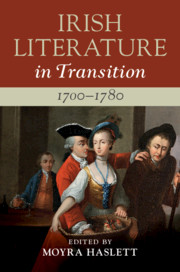Book contents
- Irish Literature in Transition, 1700–1780
- Irish Literature in Transition
- Irish Literature in Transition, 1700–1780
- Copyright page
- Contents
- Illustrations
- Contributors
- Series Preface
- General Acknowledgements
- Introduction
- Part I Starting Points
- Part II Philosophical and Political Frameworks
- Part III Local, National, and Transnational Contexts
- Chapter 7 Land and Landscape in Irish Poetry in English, 1700–1780
- Chapter 8 The Idea of an Eighteenth-Century National Theatre
- Chapter 9 Transnational Influence and Exchange: The Intersections between Irish and French Sentimental Novels
- Chapter 10 ‘An Example to the Whole World’: Patriotism and Imperialism in Early Irish Fiction
- Part IV Gender and Sexuality
- Part V Transcultural Contexts
- Part VI Retrospective Readings
- Index
Chapter 9 - Transnational Influence and Exchange: The Intersections between Irish and French Sentimental Novels
from Part III - Local, National, and Transnational Contexts
Published online by Cambridge University Press: 28 February 2020
- Irish Literature in Transition, 1700–1780
- Irish Literature in Transition
- Irish Literature in Transition, 1700–1780
- Copyright page
- Contents
- Illustrations
- Contributors
- Series Preface
- General Acknowledgements
- Introduction
- Part I Starting Points
- Part II Philosophical and Political Frameworks
- Part III Local, National, and Transnational Contexts
- Chapter 7 Land and Landscape in Irish Poetry in English, 1700–1780
- Chapter 8 The Idea of an Eighteenth-Century National Theatre
- Chapter 9 Transnational Influence and Exchange: The Intersections between Irish and French Sentimental Novels
- Chapter 10 ‘An Example to the Whole World’: Patriotism and Imperialism in Early Irish Fiction
- Part IV Gender and Sexuality
- Part V Transcultural Contexts
- Part VI Retrospective Readings
- Index
Summary
The European popularity of the novel of sentiment, particularly in France, changed the geography of reception for early Irish novels, with increased cultural exchanges taking place between Ireland and France. Frances Sheridan’s The Memoirs of Miss Sidney Bidulph (1761) and Conclusion of the Memoirs of Miss Sidney Bidulph (1767) were both translated into French within their first years of publication, for example, both novels clearly having been informed by French works. The audience in Ireland for sentimental writing from France was extensive, and works by Marie-Jeanne Riccoboni were particularly in demand. A comparative reading of the novels of Sheridan and Riccoboni reveals links in themes and style, form and emphasis, while also offering evidence for parallels in the two women’s experience of translation as a force of transnationalism. This chapter considers the careers and publication histories of Sheridan and Riccoboni in order to explore the intersections between Irish and French iterations of sentimental fiction in the 1760s and 1770s. It explores the writings of both women; their engagements with the world of translation; and the reception of their work. This chapter posits that transnational comparisons are essential to any understanding of ‘national’ traditions.
Keywords
- Type
- Chapter
- Information
- Irish Literature in Transition, 1700–1780 , pp. 189 - 206Publisher: Cambridge University PressPrint publication year: 2020



